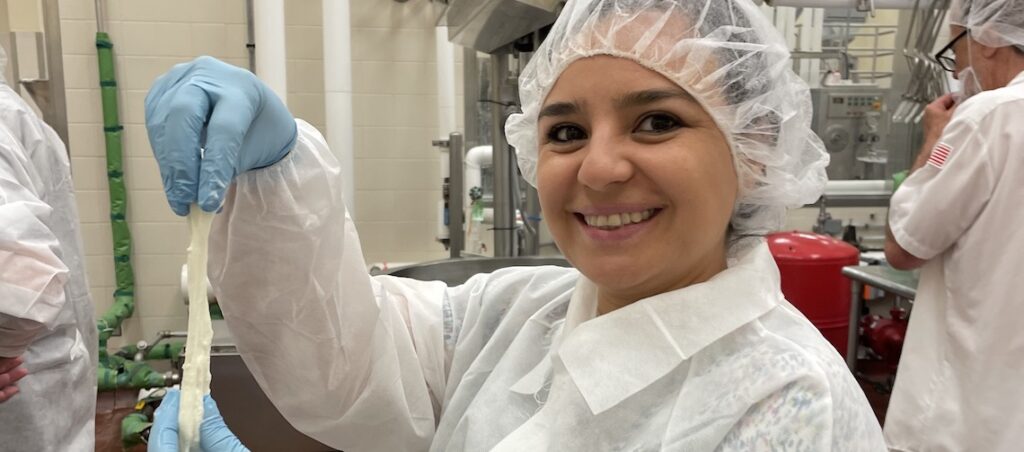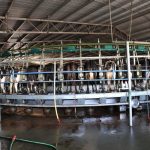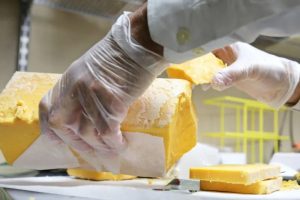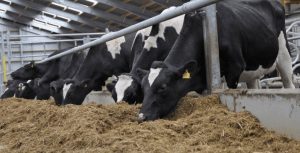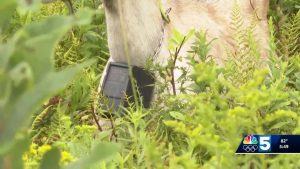
Fresno State is helping provide opportunities to dairy businesses to help the industry strengthen its bones.
Hosted by Fresno State, the Pacific Coast Coalition—Dairy Business Innovation Initiative (PCC-DBII) is currently offering $1.5 million for dairy businesses in Arizona, Nevada, New Mexico, Oregon, Washington and California.
The initiative aims to bolster the dairy industry, supporting product innovation, market diversification, business development and the use of regionally produced milk.
Fresno State named 28 winners across the participating states in May, including Rosa Brothers in Hanford, which was awarded nearly $1 million to purchase ice cream equipment to meet demands, produce novelty items, provide healthier alternatives and spread into the pet food market with Greek-Style frozen yogurt pet treats.
There were 10 dairy businesses that applied for grants in the counties of Fresno, Madera, Tulare, and Kings.
Grant applications will be accepted until Sept. 30.
Dr. Carmen Licon, a former assistant professor for food processing and engineering at Fresno State’s Department of Food Science and Nutrition, was recently named the winner of the annual Daphne Zepos Teaching Award to fund research in the cheese industry.
“All projects are exciting, allowing dairy processors to make nutritious, delicious dairy products available locally, regionally, nationally and internationally,” Licon said.
She is currently the director of the Dairy Products Technology Center at Cal Poly San Luis Obispo and the director of the PCC-DBII hosted by Fresno state.
Later this year, Licon will spend about two weeks traveling and researching the European dairy vocational systems in France and Italy to help develop a similar program that can be utilized throughout the United States.
Licon said the initiative is focusing on value-added products from creameries and dairy processors, not just dairy farms directly.
She said dairy businesses are mainly using the grant awards for equipment and automation for labor intensive operations to modernize their facilities. The grants also support dairy businesses that have career pathways for students.
Some businesses applied for technical assistance to develop new products and create new formulations for existing products.
Though milk consumption has trended downwards for decades, with Americans drinking 0.69 cups of milk in 2000 compared to 0.49 cups in 2019, according to the U.S. Department of Agriculture, Licon said people are shifting how they consume milk, buying more cheese, specialty cheeses, butter and more cultured and fermented products.
Licon said one of the main needs of the industry in general is getting qualified employees, including general laborers, as well as technically skilled workers.
The trip to France and Italy, which both have rich traditions in cheesemaking, will serve as an opportunity to visit their schools and see if a vocational program can be developed in the United States.
“At first we are emphasizing cheesemaking, but with the idea to eventually have dairy products in general,” Licon said.
Starting off with technical programs would serve as a way to first attract students to the dairy industry, who could then enroll in bachelor’s or master’s programs, potentially having a career in dairy.
Licon said if educational institutions don’t do anything to attract people to the industry, we might not have cheesemakers in the next 20 years.
Younger generations might not be attracted to cheesemaking or the dairy industry in general, Licon said, with shifting work schedules, but getting them excited early on in their careers about the industry could inspire them to continue, she said.
Licon herself was born in a dairy region in Mexico — Delicias, Chihuahua — where she lived half her life, later moving to the Mexican state of Tamaulipas.
Her family was always involved in agriculture. She saw it as hard work, but wanted to be involved in the industry.
“I wanted to still get involved but in a different way. I saw research and education as a way to give back to agriculture,” Licon said.
You can now read the most important #news on #eDairyNews #Whatsapp channels!!!
🇺🇸 eDairy News INGLÊS: https://whatsapp.com/channel/0029VaKsjzGDTkJyIN6hcP1K
